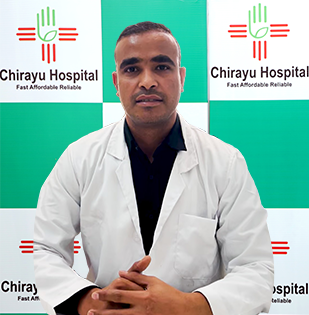
Best Laparoscopic Surgery in Jaipur, Rajasthan
Get Treated by Experienced Laparoscopic Surgeons at Chirayu Hospital
Laparoscopic surgery, also known as keyhole surgery or minimally invasive surgery, is a modern technique used to treat many medical conditions with smaller cuts, faster recovery, and fewer complications. At Chirayu Hospital, Jaipur, we specialize in offering the best laparoscopic surgery with advanced equipment and highly experienced surgeons.
Whether you need surgery for gallbladder stones, appendix, hernia, or any abdominal issue – Chirayu Hospital is the right place for safe and effective treatment.
What is Laparoscopic Surgery?
Laparoscopic surgery is a procedure that uses a thin tube with a camera and light (called a laparoscope) to look inside the body. Instead of making large cuts, doctors make 2-3 small cuts (usually less than 1 cm) to perform the surgery. The camera shows the inside of the body on a screen, and the surgeon performs the operation using special tools.
This method is widely used for surgeries like:
- Gallbladder removal (Cholecystectomy)
- Appendix removal (Appendectomy)
- Hernia repair
- Intestinal surgeries
- Ovarian cyst removal
- Hysterectomy (uterus removal)
Why Choose Laparoscopic Surgery?
There are many reasons why laparoscopic surgery is a better option than traditional open surgery:
- Smaller cuts – Less pain and faster healing
- Minimal scarring – Very small marks after surgery
- Faster recovery time – Most patients go home within a day or two
- Lower risk of infection – Because the wounds are smaller
- Less blood loss – During the operation
At Chirayu Hospital, we follow strict safety protocols and use the latest tools to ensure each laparoscopic surgery is successful and comfortable for the patient.
Why Choose Chirayu Hospital for Laparoscopic Surgery in Jaipur?
When it comes to health, you deserve the best care. Here's why patients trust Chirayu Hospital:
- Experienced Surgeons: Our team includes some of the most skilled and trained laparoscopic surgeons in Jaipur. With years of experience, they handle each case with great care and precision.
- Advanced Technology: We use high-definition laparoscopic equipment and the latest surgical tools for accurate and safe procedures.
- Affordable Packages: We believe in providing high-quality treatment at reasonable prices. Our laparoscopic surgery packages are designed to be cost-effective for every patient.
- Personalized Care: At Chirayu, every patient gets personal attention. From the first consultation to post-surgery care, we are with you at every step.
- Clean & Modern Infrastructure: Our operation theatres and patient rooms are clean, modern, and fully equipped to handle all types of laparoscopic procedures.
Conditions We Treat with Laparoscopic Surgery
At Chirayu Hospital, we offer laparoscopic treatment for:
- Gallstones – Removal of the gallbladder
- Appendicitis – Removal of the infected appendix
- Inguinal Hernia – Repair with mesh using laparoscopy
- Ovarian Cysts – Removal of large or painful cysts
- Ectopic Pregnancy – Safe removal using laparoscopy
- Uterus-related issues – Fibroids, hysterectomy, etc.
What to Expect Before and After Surgery
Before the Surgery:
- You’ll meet with your surgeon to discuss your condition
- Some blood tests or scans may be required
- You may be asked not to eat or drink a few hours before surgery
After the Surgery:
- Most patients can go home within 24–48 hours
- You may feel mild pain or discomfort for a few days
- Your doctor will guide you on rest, food, and medicine
- You can return to work or daily routine within 1–2 weeks
Book Your Appointment Today
If you or your loved one needs laparoscopic surgery in Jaipur, don’t wait. Early treatment leads to better results and faster recovery. At Chirayu Hospital, you get the care, technology, and expertise you can trust.
FAQs
Our Surgeons

Dr. Krishna Kumar Verma
(MBBS, DNB (General Surgery))
[ Dr. Krishna Kumar Verma]

 Telemedicine
Telemedicine 
